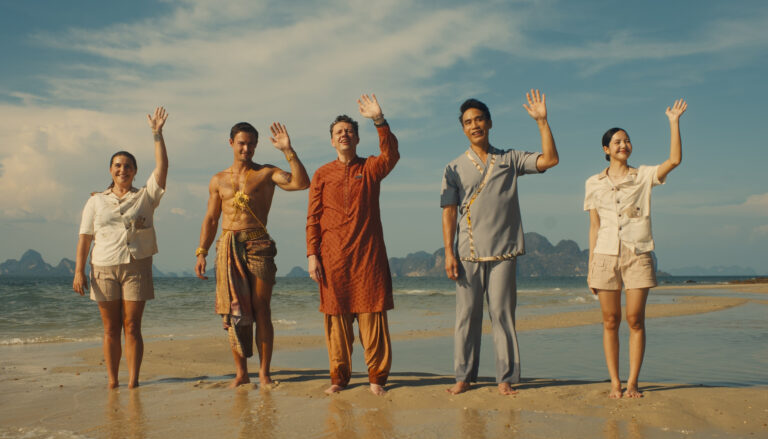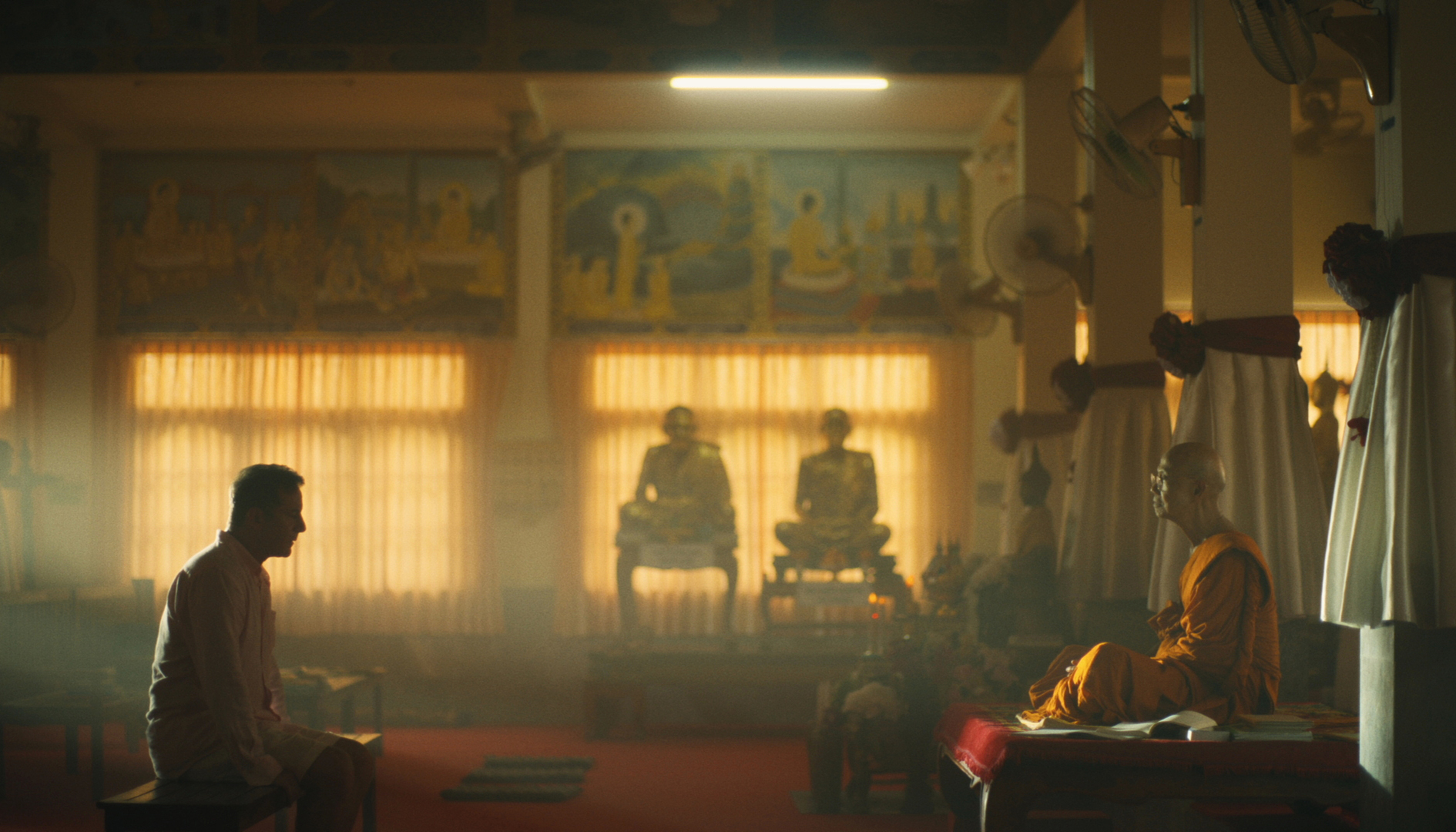Ahead of ‘The White Lotus’ Finale, Berkeley Professor Unpacks Show’s Freudian Themes and Fantasies
Poulomi Saha, who studies post-colonialism and psychoanalytic critique, breaks down season three of the HBO series, from why it's set in Thailand to the unforgettable monologue in episode five.

There’s a part in season three of the HBO series The White Lotus that viewers won’t easily forget. Frank, a newly sober American expat living in Thailand, where the show takes place, begins to explain to his old friend Rick why he’s gone sober. In detailing his descent into partying and sex addiction, he describes what he sees as a kind of Buddhist realization about his own desires: It’s not that he wants to exploit and subjugate the Asian women he pursues; it’s that he wants to be the Asian women.

“What appears to be a very straightforward form of white male domination of the Asian woman’s body gets turned on its head,” says Poulomi Saha, a UC Berkeley associate professor of English who studies post-colonialism, psychoanalytic critique and feminist and queer theory. “It’s a brilliant way to think about the cost of unending pleasure being accessible to you — it changes you.”
It’s one of many moments in the series that Saha says are revelatory — not simply because they’re shocking, but because they hold up a mirror to race and gender dynamics in American society in a way that’s unique in television today.
As season three approaches its finale this Sunday, Saha spoke to Sarah Fullerton, the communications director for the Division of Arts and Humanities, about the Western idea of Thailand as a place of unbridled freedom and spiritual awakening, and why The White Lotus is the most Freudian show Saha has seen in a long time.
Sarah Fullerton: Every season of The White Lotus follows a group of wealthy guests at luxury resorts around the world, from Hawaii to Italy and now Thailand in Southeast Asia. Why is this season’s location particularly interesting to you?
Poulomi Saha: As a scholar of cultural studies, post-colonial studies and Asian American studies, the fact that The White Lotus is set in Thailand and seems to spend so much of this season focusing on American desires getting played out in Asia is a really exciting thing for me. The fact that this season has all of this investment in things like yoga culture, the possibility of someone joining a cult and what is a cult — it only sharpens my interest. But the location, I think, opens up a new avenue of thinking about what kinds of fantasies The White Lotus as a television show does for us as Americans.
Why do you think creator Mike White chose Thailand? What themes have you seen come through?
The question of Asia as a kind of playground for American and Western pleasures is really coming to the fore. On the one hand, you have at the beginning of the season this sense that everyone is going to be inside the resort and not somewhere actually foreign.
But by the latter part of the season, we are fully in another country. We feel the presence of Thailand, of what Thailand is in particular, as a place where people can go and buy access to whatever they want, whether it’s sex or spirituality. And we see the ways in which a kind of menu of options on offer for a person with deep enough pockets is so alluring.

And because The White Lotus is so smart to show us an upstairs-downstairs model of tourism, we also see the laborers, and the pleasures and the complications of the staff, some of whom are Thai, some of whom aren’t, but who have to play this really interesting intermediary role to people’s desires. There’s this sense that Asia is a font of a particular kind of spirituality that is open to the consumption of especially wealthy white Americans.
Where did the Western idea of Thailand as a place of escape, where Americans have total freedom to do what they want without repercussions, come from?
It goes back to the history of American empire and war. This fantasy of Southeast Asia as a playground for white desire has a long history in American GIs in Southeast Asia and what they would do during shore leave during the Cold War, the Korean War, through the war in Vietnam into this moment. This ready access to pleasure as a way to blow off steam from being a soldier is part of what is underpinning the “never-ending carousel of lust and suffering,” as Frank, an expat played by Sam Rockwell, puts it.
That then is taken up, again, during the Cold War, with the coming of expats who, because a whole set of American projects to fund investment and research and security goals overseas, find themselves in a place where they have outsized resources and privilege. And they actually help to construct the tourist industry that then draws more Americans. There is a long history of the imbrication of empire and pleasure in Asia, and America is right at the heart of it.
Do you think Mike White’s aware of that?
He’s such a savvy writer, even if he’s not explicitly aware of this history, he spent enough time looking at the culture of expats in Southeast Asia to understand the dynamics. We don’t see it anywhere more sharply than in Sam Rockwell’s unforgettable monologue in episode five.

It is such a shockingly self-aware articulation of how desire works through the American body in Asia. You have a man who is in this kind of confession to his mirrored self. The cinematography places Rockwell and Walton Goggins, who plays his old friend Rick, face to face with one another, with their faces kind of mimicking each other.
It’s a brilliant way to think about the cost of unending pleasure being accessible to you — it changes you. You actually become a different person when every one of your desires can be met whenever you want them.
What Rockwell’s character actually shows us is how that unending access and privilege made him realize there is something else that he’s seeking. He’s seeking a kind of subjugation, which is a dirty, ugly desire and one that is so compelling and, Sigmund Freud would say, incredibly universal.
What would Freud say is going on here?
This is easily the most Freudian season, and maybe the most Freudian show I’ve seen in a very long time. Every season, of course, The White Lotus has a different family, a nuclear family at its core. You had the Mossbachers in season one, you had the Di Grassos in season two. Season three, we have the Ratliffs.
But this season places the question of oedipal triangles and uncomfortable forms of familial desire right at the fore. We begin with the foreshadowing of a kind of incestuous relationship between the siblings in the very first episode, which does not go the way we expect. By the time we hit episode five and episode six, we believe in that first episode that it’s incestuous desire towards the sister shared by Lachlan and Saxon. Instead, in classic Freudian, oedipal form, it becomes about the brothers’ desire for each other.
This is the part about oedipal conflict that we too often forget: We think of it as a pure triangle. You have the father, the mother and the son. But the real oedipal conflict that drives Freud’s theories, and the ones that we see played out more frequently, is actually about brothers.
During the season, we see the father of the family, Timothy, falling apart emotionally after he finds out he was caught in a money-laundering scheme and will have to face the consequences when they get home. His son Saxon tells him, “I have basically become you. You’re the only identity I have. If you go down, I don’t know who I am anymore. I’ve modeled my entire body after you.”
That is a pure oedipal moment, where the all-powerful father is about to potentially disappear. Can he actually stand on his own? The fact that Timothy also has all these fantasies of killing his family is another element of the complicated forms of desire and power. His sense is that if he loses his money, it is his job to kill his family. His power disappearing means their lives disappear.
The daughter, Piper, is portrayed as seeking spiritual awakening in Thailand, but her mother, Victoria, quickly dismisses the Buddhist monastery she’s drawn to as a “cult.” How does this dynamic reflect the tension between privilege and cultural appropriation, and what does it say about the stereotype of Westerners searching for enlightenment in Eastern traditions?
The scene where Piper and Victoria are talking about Piper’s desire to join this monastery is rife with the big questions around why we call things a cult. What Victoria is responding to is the fact that Piper has said that her life — filled with every material need being met, all of the social approval that you might want, the academic success — all of that is not enough. Piper has it all, and she’s still seeking.

Eastern spirituality is often what seems to be the great panacea, because it is such a different form of thinking about the individual, of thinking about society, of thinking about what life is for. It allows people who feel that the structures of Protestant American success, which are deeply unfulfilling to them, might actually be solved by this other form of life.
We have that beautiful scene where Timothy sits in front of the monk and he’s asking questions he cannot ask in his own life, and that’s where we really see why people are so drawn to Eastern spirituality: You can ask a different kind of question. You can ask the question that maybe gets to the heart of what’s missing in your life or what you fear, but that is otherwise written out of how you understand yourself in Western culture.
At the end of The White Lotus, someone always dies. We heard a gunshot in the first episode. Do you have any theories about what will happen in the last episode?
I think the monkeys did it. I mean, I am trying to be a good reader of a particular genre of red herrings and the fact that we had all of these early episodes focused on the monkeys, there’s all these warnings about their mischief. I think that they’re the ones who are firing the gun, that there will be human casualties and danger. But what we think is the real danger, the firing of the gun from the first episode, will be the red herring. It’ll be monkeys in mischief while the real harm and violence and death is happening between humans in some other form.
If I were to take a bet, I would also say that Timothy joins the monastery and becomes, if not a monk, then a recluse. And I’m hoping that Belinda makes it out alive. If there’s anyone I’m cheering for, it’s Belinda.
I think Belinda is going to be the murderer.
You’re blowing my mind right now.
I think it’s Belinda!
This interview has been condensed and edited for clarity.
